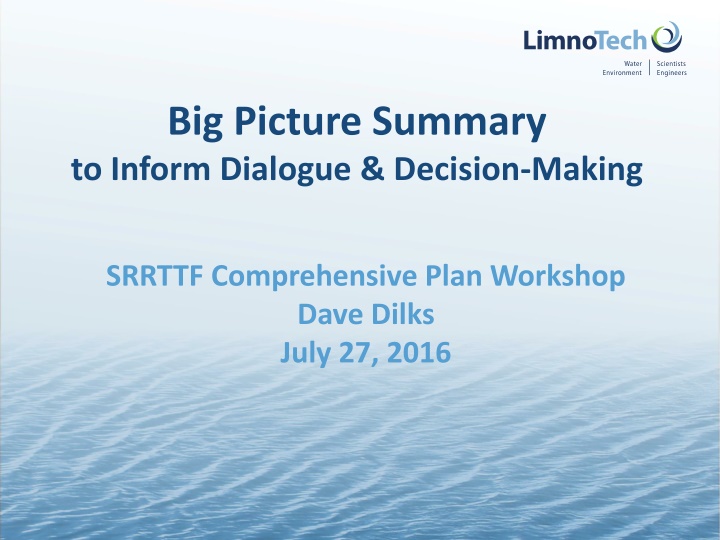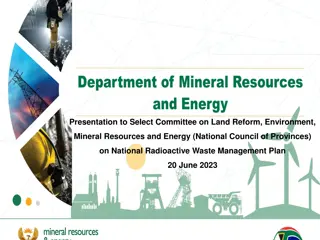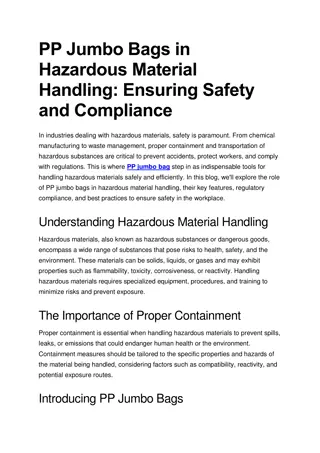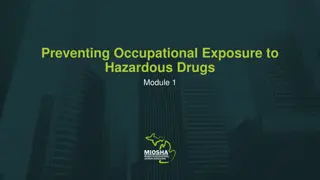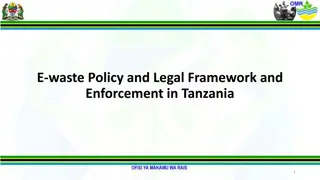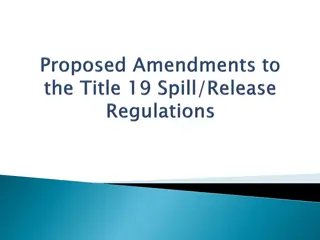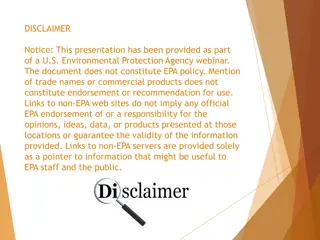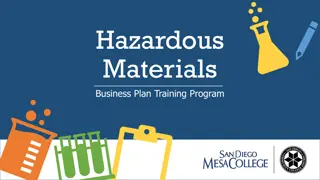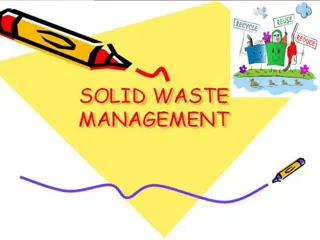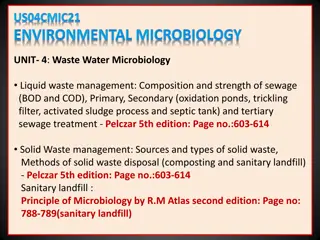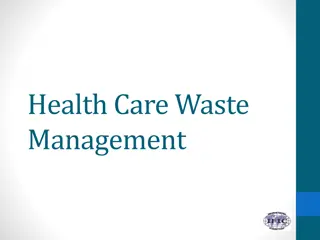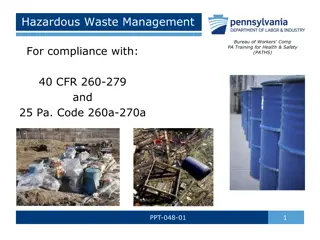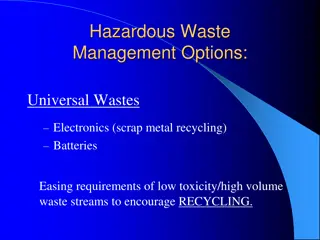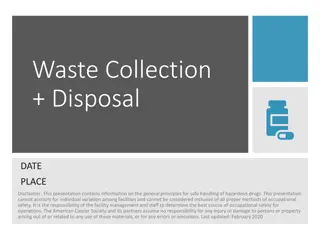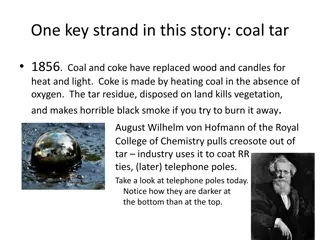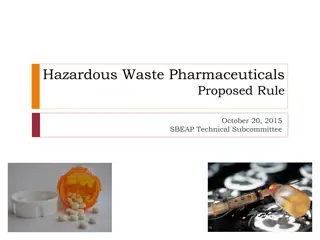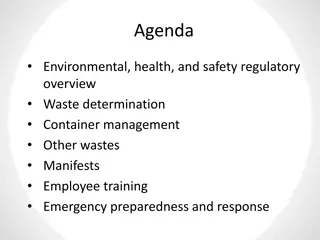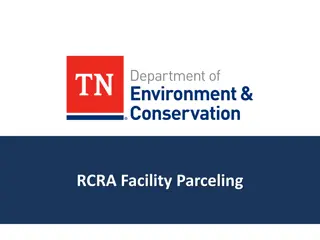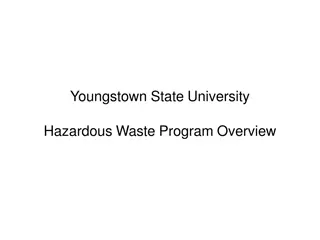Making RCRA Hazardous Waste Regulations Work for You
Learn how to leverage RCRA hazardous waste regulations and policies to effectively clean up contaminated sites. Discover key strategies, policies, and tools to streamline the cleanup process and achieve success.
Download Presentation

Please find below an Image/Link to download the presentation.
The content on the website is provided AS IS for your information and personal use only. It may not be sold, licensed, or shared on other websites without obtaining consent from the author.If you encounter any issues during the download, it is possible that the publisher has removed the file from their server.
You are allowed to download the files provided on this website for personal or commercial use, subject to the condition that they are used lawfully. All files are the property of their respective owners.
The content on the website is provided AS IS for your information and personal use only. It may not be sold, licensed, or shared on other websites without obtaining consent from the author.
E N D
Presentation Transcript
Big Picture Summary to Inform Dialogue & Decision-Making SRRTTF Comprehensive Plan Workshop Dave Dilks July 27, 2016
Outline Overview of Control Actions and the Comprehensive Plan Guidelines for Evaluation Quick Recap of Control Actions
Comprehensive Plan Definition From 2012 Task Force Work Plan Comprehensive Plan means a report that: describes the data and the analytical process, identifies available Best Management Practices (BMPs) and assesses their potential effectiveness, recommends a plan for implementation of BMPs that are potentially suitable in the Spokane River Watershed We are now using the term Control Action instead of Best Management Practice
Comprehensive Plan Content Plan will contain sections discussing: PCB Source Assessment PCB Best Management Practices Control Actions Recommended Implementation Plan Future Studies
Implementation Plan Describes the Control Actions to be implemented, and how they will be assessed Every Control Action included in the Implementation Plan must have Milestones Timelines Effectiveness monitoring
Future Studies Activities to be pursued beyond the implementation plan Monitoring to fill data gaps Further consideration of select Control Actions not currently amenable for inclusion in the Implementation Plan
Overview of Control Actions 27 categories of Control Actions to be evaluated Cover categories including: Instituional Government Practices Regulatory Actions Incentivized Voluntary Programs Public Education Stormwater Treatment Wastewater Treatment Contaminated Site Remediation
Evaluation of Control Actions Control Actions have been assessed in terms of: Magnitude of pollutant load addressed Potential effectiveness in controlling that load Costs Implementing entity Timeframe for implementation and observable response Ancillary benefits
Tiers of Evaluation Several Actions are already being implemented Address every known major delivery pathway These are ones expected to provide noticeable improvements in water quality Others Control Actions are new Typically contain much more uncertainty in their effectiveness than existing actions
Evaluation of Control Actions in the Process of Being Implemented Two choices for existing Control Actions A. Maintain current efforts, document in Plan B. Identify/commit to improvements
Evaluation of New Control Actions Three choices C. Include in Implementation Plan section of Comprehensive Plan D. Uncertain, worth exploring Potentially include in Future Studies Section of Comprehensive Plan E. Not a fit for Spokane River
Key Considerations Prior to Recommending New Actions Every Control Action included in the Implementation Plan must have Milestones Timelines Effectiveness monitoring As such, each new action requires a party to take responsibility for its implementation If the responsible party is anyone other than the Task Force, need their explicit buy-in
Quick Recap of Individual Control Actions Actions already being implemented less amenable to revision Actions already being implemented potentially amenable to revision New Actions
Existing Actions - Less Amenable to Revision Wastewater Treatment Remediate Known Contaminated Sites LID ordinance Stormwater controls
Existing Actions - Potentially Amenable to Revision Street sweeping, Leaf removal Support green chemistry Working with chemical manufacturers to either develop alternative (non-chlorinated) products or develop products with reduced levels of PCBs. ID new contaminated sites Purchasing standards Expand to Idaho?
New Control Actions Disposal Assistance for PCB-Containing Items Develop programs designed to accept and properly dispose of PCB-containing items, preventing legacy non-fixed building sources such as small appliances and lamp ballasts from potentially being disposed of improperly. Infrastructure for this program largely exists in Washington via take-back programs for mercury- containing light
New Control Actions Regulation of Waste Disposal Develop programs designed to review local/regional laws regulating waste disposal (including oil burning) and illegal dumping, and revise as necessary (e.g. enforcing fines/other penalties for improperly disposing of PCBs.) Removal of Carp from Lake Spokane This action involves removing carp from Lake Spokane. Carp in the lake are known to be contaminated with PCBs, and removing them would prevent further cycling in the watershed.
New Control Actions Building Demolition Control Actions This Control Action consists of establishing regulations or local ordinances that require management of PCB containing materials and waste during building demolition and renovation. PCB-Product Labeling Law This action consists of developing and passing an ordinance that requires labeling products that contain PCBs, similar to the 2014 law for labeling construction materials that contain asbestos (RCW 70.310.030).
New Control Actions Survey of Local Utilities for Electrical Equipment Conduct a survey of local utilities and other owners of electrical equipment to document the presence/amount of PCBs in transformers. Identify PCB-containing equipment (nominal 1 ppm concentration) that has a reasonable pathway to the river, if spilled, and target for removal. Leak Prevention/Detection in Electrical Equipment This action consists of implementation of state and/or local ordinances to require a leak prevention/detection system in any PCB-containing transformer or capacitor.
New Control Actions Accelerated Sewer Construction This action consists of acceleration of sewer construction to replace septic systems. Note: Could theoretically be placed under Existing Actions given Spokane s County s mandatory septic tank elimination program. Could also be applied to parcels in the Critical Aquifer Recharge Area (CARA) that are not in the Urban Growth Area (UGA).
New Control Actions PCB Identification during Inspections This action consists of identifying PCB-containing materials as part of other regular inspections (e.g., building permits, IDDE, facility inspections). It involves training inspectors to identify materials and what to do next (safe disposal, encapsulation, etc.)
New Control Actions Regulatory Rulemaking This action consists of regulatory reform of Federal TSCA and FDA s food packaging regulations (21 CFR 109) to 1) re-visit currently allowed concentration of PCBs in chemical processes; 2) eliminate or reduce the creation of inadvertently generated PCB; and 3) reassess the current use authorizations for PCBs.
New Control Actions Compliance with PCB Regulations This control action consists requiring stricter accountability for compliance with existing rules. Potential activities include enforcement of existing TSCA rules to ensure imported and manufactured products are complying with allowable PCB levels.
New Control Actions Survey of PCB-containing Materials in Schools/Public Buildings Programs designed to survey PCB-containing materials in schools/public buildings and enact a program to dispose of them properly or implement encapsulation. Education/Outreach about PCB Sources Conduct public education and outreach campaigns to spread information about the potential sources of PCBs, what to do with them if discovered (e.g., avoid pouring paint down the drain), and safer alternatives.
New Control Actions Education about Discharge through Septic Systems Educate on-site septic system owners located over the aquifer recharge area on proper disposal of wastes (e.g., not down the drain ) and on the environmental and functional benefits of regular tank pumping. Education about Filtering of Post-consumer Paper Products Conduct public education and outreach campaigns to inform the public about separating recycling materials that are paper w/yellow inks/pigments into the garbage stream rather than recycle bin (educational sticker on bins).
New Control Actions PCB Product Information This Control Action consists of further study of the extent to which commercial products contain inadvertently produced PCBs, as well as creation of a database to store the collected information. Emerging End of Stormwater Pipe Technologies Research innovative methods such as mycoremediation with fungi, bio-char, etc.
